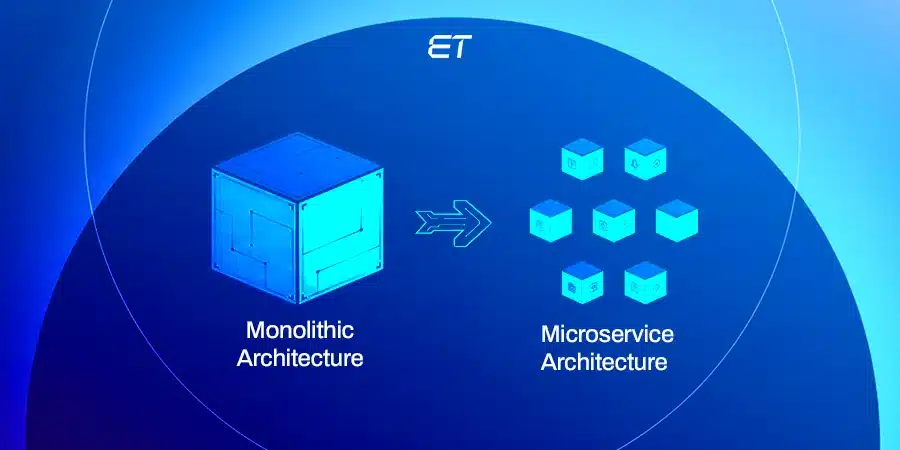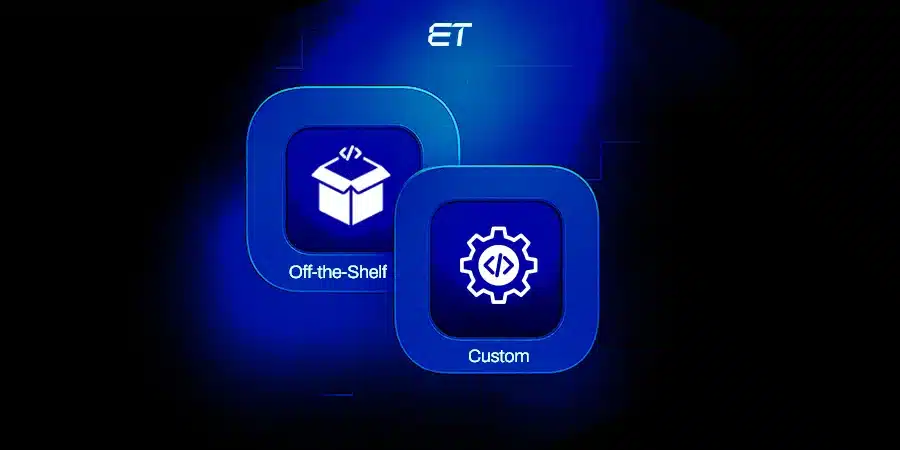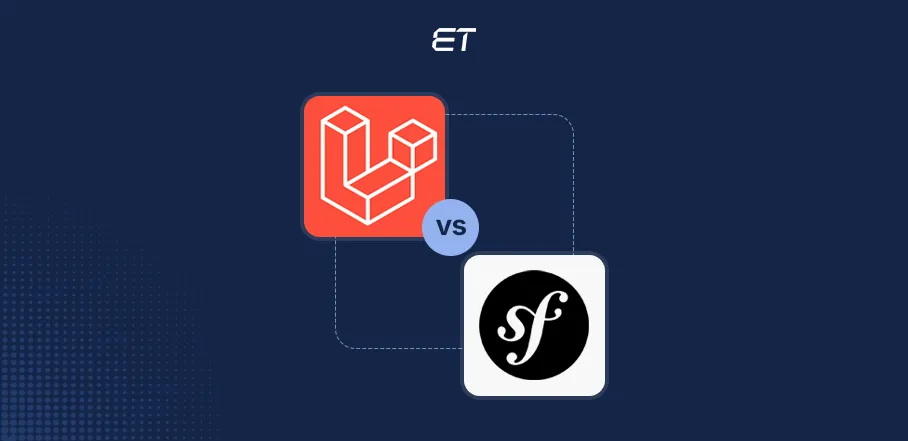
Laravel vs Symfony: Which Framework Aligns With Your Business Goals?
Have you ever met an artist? You must have seen how they use different tools for painting different objects. Artists know that the tools and equipment they choose greatly impact the success of their paintings. Similarly, in web development projects, selecting the right framework is just as critical. This choice determines how smoothly your project runs and how well it serves your business needs.
With several years of experience, we’ve met business leaders who faced a tough decision between two popular PHP frameworks: Laravel vs Symfony. Many consider Laravel the ideal PHP framework due to its robust features, modular packaging system, and strong community recognition among expert PHP developers. Their choice didn’t just affect their development team; it influenced their company’s growth and ability to adapt in a competitive market. Later, they realized that understanding the strengths and nuances of each option was essential.
So, today, in this blog, we’ll walk through the key aspects of Laravel vs Symfony. We’ll explore their features, benefits, and how each framework can align with your company’s goals. Whether you’re looking for rapid development or an option that can handle complex, scalable applications, this guide will help you make an informed decision without getting lost in technical jargon.
Code brilliance with Laravel and Symfony. Let’s craft your next digital masterpiece!
Laravel — A Quick Overview of the PHP Framework
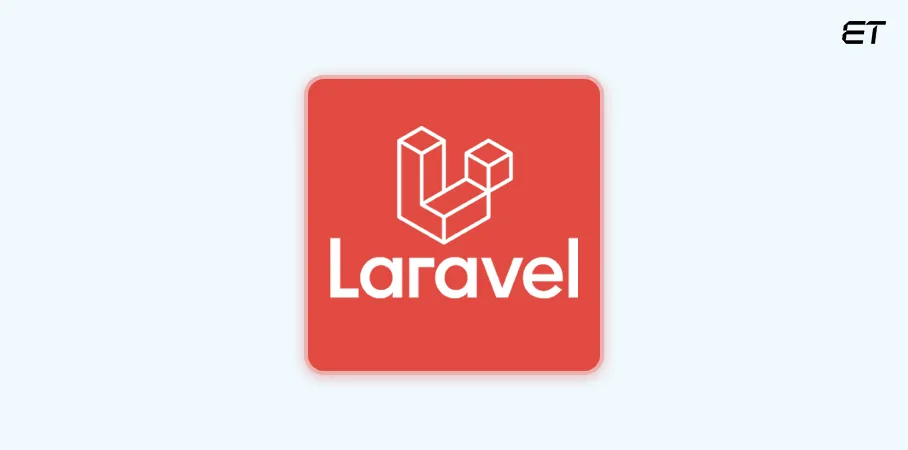
Think of the Laravel framework as a friendly assistant that helps you build web applications more easily and quickly. It’s a free, open-source PHP framework designed to make the web development process straightforward and even enjoyable.
Laravel was created to simplify common tasks in most web development projects, such as authentication, routing, sessions, and caching. It uses a design pattern called Model-View-Controller (MVC), which helps keep your code organized by separating the application’s logic, user interface, and data.
Here’s why Laravel stands out:
- Laravel’s code is clean and easy to read, so developers can understand and modify it without much hassle.
- It comes packed with tools that handle routine tasks. So developers can focus on what makes their application unique.
- Laravel has a large, active community that contributes to its improvement and offers support through forums and tutorials.
- With built-in libraries and a marketplace for add-ons, you can extend Laravel’s functionality to suit your project’s needs.
In simple terms, the Laravel framework is like a well-organized toolkit for building complex web applications. It provides structure and pre-built components, so you don’t have to start from scratch. Whether you’re developing a small website or a complex enterprise system, Laravel helps streamline the process, making it faster and more efficient.
Pros of Laravel
- Laravel offers an elegant and expressive syntax, making it accessible for Laravel developers, even those new to PHP frameworks.
- With built-in tools like Artisan CLI and Eloquent ORM, Laravel streamlines common tasks, speeding up the development process.
- It provides essential features out-of-the-box, such as authentication, routing, and caching, allowing developers to focus on core functionality.
- It has a large, active community, which means that extensive resources, tutorials, and third-party packages are readily available.
- It follows the Model-View-Controller pattern, promoting organized and maintainable code structures.
- It simplifies the creation of dynamic layouts with reusable components, enhancing productivity and consistency.
- Using an object-relational mapper, Laravel offers an intuitive and straightforward way to interact with databases.
Cons of Laravel
- It may require optimization to handle large-scale, enterprise-level applications with heavy traffic.
- The “convention over configuration” approach can limit customization for highly specialized project requirements.
- Regular releases can introduce changes that require updates to existing code, increasing maintenance efforts.
- Managing a large number of middleware components can become complex and may impact application performance.
- While basic features are easy to grasp, mastering advanced functionalities may require additional time and learning.
- Scaling Laravel applications might need additional tools and strategies, such as caching systems or load balancers.
Empower your web projects with top Laravel developers. Hire expertise that delivers excellence today!
Symfony Framework – A Quick Overview
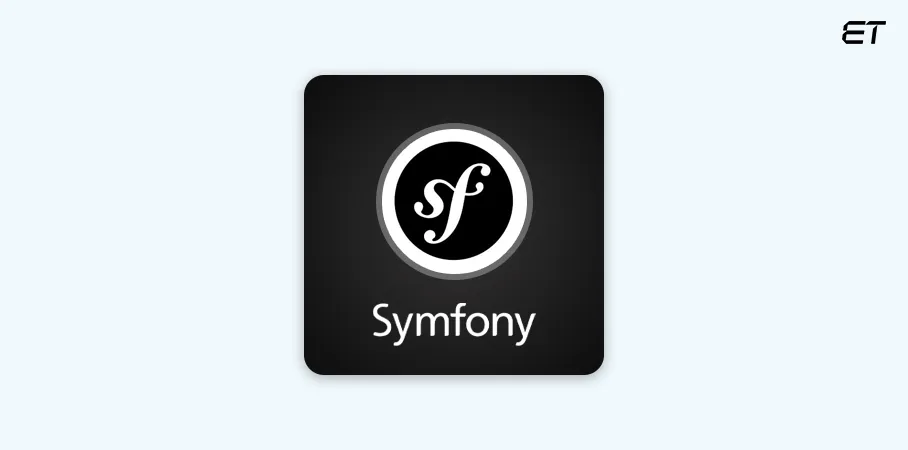
Symfony framework is a powerful, open-source PHP framework designed to help developers create complex web applications with ease. It provides a set of reusable components and tools that handle common tasks, so you don’t have to start from scratch every time.
Here’s what makes Symfony stand out:
- It is built with a modular architecture, meaning you can use as much or as little of it as you need. Whether you want the full framework or just specific components, it’s adaptable to your project’s requirements.
- It uses the Model-View-Controller (MVC) architecture, which separates your code into logical sections. This makes your application more organized and easier to maintain.
- Backed by SensioLabs, Symfony has a dedicated community of developers contributing to its ongoing improvement. You’ll find extensive documentation, tutorials, and professional support available.
- Symfony is known for its stability and scalability, making it a popular choice for enterprise-level applications that require high performance and customization.
In simple terms, Symfony is like a robust toolkit for building sophisticated web applications. It takes care of the heavy lifting by providing essential features out-of-the-box, such as routing, templating, and security. This lets you focus on what makes your application unique without getting bogged down by repetitive tasks.
Whether you’re developing a simple website or a complex system, Symfony offers the flexibility and power to help you create high-quality applications efficiently.
Pros of Symfony
- Symfony’s modular, component-based architecture allows you to use only the parts you need. This flexibility is ideal for complex projects requiring custom solutions.
- Designed for large-scale applications, Symfony excels in handling high-traffic and complex operations, making it suitable for enterprise-level projects.
- It offers robust security mechanisms, including advanced authentication and authorization systems, catering to applications that require strict security compliance.
- Symfony components can be used independently in any PHP project. This reusability speeds up development and promotes consistent coding practices.
- It follows PHP framework and web development process standards closely, ensuring code quality and compatibility with other libraries and frameworks.
- It provides long-term support versions, offering extended maintenance and security updates, which is crucial for business-critical applications.
- It offers extensive documentation and professional support services.
- It has built-in features for translating applications to make it easier to develop multilingual websites.
Cons of Symfony
- The framework’s complexity requires a deeper understanding, making it less accessible for beginners or teams unfamiliar with Symfony.
- Initial setup and configuration can be time-consuming, potentially slowing down development for projects with tight deadlines.
- Requires more manual setup for common tasks, as it doesn’t provide as many built-in features as some other frameworks.
- While active and professional, Symfony’s community is smaller compared to Laravel’s, which might mean fewer third-party bundles and resources.
- It may require more experienced (and thus more expensive) developers, increasing the overall project cost.
- Symfony’s extensive features might be unnecessary for small or simple applications, adding complexity without significant benefits.
- Detailed configuration can be overwhelming and may lead to increased development time if not managed properly.
A Comparative Analysis: Laravel vs Symfony in Web Development
Selecting the right framework for your web application is a pivotal decision that influences development efficiency, scalability, and long-term maintainability. Let’s explore the key features of Laravel vs Symfony to help you determine which one aligns best with your software development project’s needs.
Before we discuss the differences in detail, let’s glance at the table first:
| Aspect | Laravel | Symfony |
| Learning Curve and Ease of Use | It is easy to learn with a gentle learning curve and is beginner-friendly, with extensive documentation and tutorials. | It has a steeper learning curve and is suited for experienced developers needing advanced features. |
| Performance and scalability | It performs well for small to medium-sized applications and may require optimization for large-scale projects. | It is built for high performance and excels in large, complex, and high-traffic applications. |
| Flexibility and Customization | It follows the ‘convention over configuration’ principle and is less flexible for highly specialized requirements. | It is highly flexible due to its modular, component-based architecture and allows extensive customization. |
| Community and Support | It has a large, active community with numerous resources and extensive third-party packages and forums. | It has a smaller, professional community and is backed by SensioLabs, which provides professional support and thorough documentation. |
| Built-in Features and Tools | It offers many built-in tools like Eloquent ORM, Blade templating, and Artisan CLI, which streamlines common tasks. | It provides reusable components rather than out-of-the-box solutions and requires assembling components as needed. |
| Security | It is ideal for rapid development and quick deployment as it reduces development time with ready-made solutions. | It offers advanced security mechanisms and is suitable for applications requiring high-level security and compliance. |
| Time-to-Market | It includes essential security features like encryption and protection against common vulnerabilities. | It requires more time upfront due to configuration and results in a robust application that is beneficial for long-term projects. |
| Ecosystem and Third-party Integrations | It has a rich ecosystem with a vast collection of packages via Composer. It is easy to extend functionality with community-contributed packages. | Components are widely recognized and used and have high interoperability with other systems and technologies. |
1. Laravel vs Symfony: Learning Curve and Ease of Use
Laravel:
Laravel is known for its simplicity and developer-friendly approach. Its syntax is expressive and intuitive, which means you can accomplish tasks with less code and in a way that feels natural. Laravel’s comprehensive documentation and a wealth of tutorials make it accessible even for those new to PHP frameworks. Laravel developers can quickly get up to speed and start building applications without a steep learning curve.
Symfony:
Symfony is designed with flexibility and advanced functionality in mind, which introduces a higher level of complexity. It has a steeper learning curve, primarily because it offers extensive customization options and requires a deeper understanding of its components and architecture. Symfony is ideal for developers who are experienced and need fine-grained control over every aspect of their application.
Laravel vs Symfony, who’s the winner?
Laravel as it is easier to learn with a gentle learning curve.
2. Performance and Scalability
Laravel:
Laravel performs exceptionally well for small to medium-sized applications, thanks to its rapid development capabilities. It includes features like caching mechanisms, which can boost performance. However, as the application grows, you might need to optimize your code and infrastructure to maintain performance levels. Laravel can scale, but it may require additional tools and strategies, such as database sharding or load balancing, to handle high-traffic scenarios effectively.
Symfony:
Symfony is built with scalability in mind and is well-suited for large, complex applications. Its modular architecture allows you to use only the components you need, reducing overhead and improving performance. Symfony’s emphasis on best practices and optimization makes it capable of handling high-load applications efficiently, making it a preferred choice for enterprise-level projects.
Laravel vs Symfony, which is better in performance and scalability aspect?
Symfony as it is built for high performance and excels in large, complex, and high-traffic applications.
3. Laravel vs Symfony: Flexibility, Customization, and Reusable PHP Components
Laravel:
Laravel follows the ‘convention over configuration’ principle, providing sensible defaults that cover most web development process. This approach accelerates development but can limit flexibility if you need to implement highly specialized features. While Laravel allows for customization, deviating from its conventions might require additional effort and could complicate the codebase.
Symfony:
Symfony offers unparalleled flexibility due to its component-based structure. You can select and use only the components relevant to your project, which means you can tailor the framework to your exact needs. This high degree of customization is beneficial for complex projects that require specific functionalities not covered by standard solutions.
Laravel vs Symfony, which provides more flexibility and customization?
Symfony as it is highly flexible, and its component-based architecture allows for extensive customization.
4. Laravel vs Symfony: Community and Support
Laravel:
Laravel has a large, vibrant community that contributes to a rich ecosystem of packages, tutorials, and forums. This active community support makes it easier to find solutions to common problems and accelerates the learning process. The abundance of resources available can significantly reduce development time and help developers overcome challenges quickly.
Symfony:
On the other hand, Symfony’s community is smaller but highly professional and focused. Symfony offers extensive documentation and professional support services. While there may be fewer community-contributed packages compared to Laravel, the quality of Symfony’s resources is excellent. This is particularly beneficial for teams working on complex applications that might require expert guidance.
Laravel vs Symfony, who is the winner here?
Laravel as it has a more active community with numerous resources.
5. Laravel vs Symfony: Built-in Features and Tools
Laravel:
Laravel comes packed with built-in tools that streamline common tasks:
- Eloquent ORM: Simplifies database interactions with an elegant ActiveRecord implementation.
- Blade Templating Engine: Allows for clean and reusable templates with easy syntax.
- Artisan CLI: Automates repetitive tasks through a powerful command-line interface.
- Queue System: Manages time-consuming tasks efficiently.
- Authentication and Authorization Systems: Provides ready-made solutions for securing your application.
These features enable rapid development and reduce the need for third-party packages, keeping your application cohesive and easier to maintain.
Symfony:
Symfony provides a collection of standalone components that can be used independently or together:
HttpFoundation Component: Manages HTTP requests and responses.
Twig Templating Engine: Offers a flexible and secure way to design templates.
Routing Component: Controls how URLs are matched to code.
Security Component: Delivers advanced authentication and authorization features.
Event Dispatcher: Facilitates communication between different parts of your application.
Symfony’s approach gives developers the freedom to build custom solutions, making it suitable for projects with specific or unconventional requirements.
Laravel vs Symfony, which provides more built-in features and tools?
Laravel offers a rich set of built-in features and tools.
6. Laravel vs Symfony: Security
Laravel:
Security is integral to Laravel’s core. It includes features such as:
- CSRF Protection: Guards against cross-site request forgery attacks.
- Input Validation: Ensures data integrity by validating user input.
- Password Hashing: Secures passwords using bcrypt hashing.
- Prepared Statements: Protects against SQL injection by using PDO parameter binding.
These built-in security measures make it easier for developers to protect their applications without extensive configuration.
Symfony:
Symfony offers robust security components that are highly configurable:
- Advanced Authentication: Supports multiple authentication mechanisms and can handle complex user access scenarios.
- Role-Based Access Control (RBAC): Provides fine-grained control over user permissions.
- Encryption and Validation Tools: Enhance data security and integrity.
- Firewall Configuration: Allows for precise security rules across different parts of the application.
Symfony’s comprehensive security features are ideal for applications that require strict compliance with security standards, such as financial or healthcare systems.
Laravel vs Symfony, which framework wins here?
Symfony, as it provides advanced security mechanisms suitable for applications requiring high-level security and compliance.
7. Laravel vs Symfony: Time-to-Market
Laravel:
Laravel is designed for rapid application development. Its expressive syntax and pre-built components allow developers to implement features quickly, reducing the time it takes to bring a product to market. This makes Laravel an excellent choice for startups and businesses that need to respond swiftly to market demands.
Symfony:
Symfony framework may require more development time upfront due to its complexity and the need for configuration. However, this investment can lead to a more robust and maintainable application in the long run. For large-scale projects that anticipate future expansion or require high reliability, Symfony’s thoroughness can result in time savings over the lifecycle of the application.
Laravel vs Symfony, which framework allows you to market your app fast?
Laravel as it is ideal for rapid development and quick deployment.
8. Laravel vs Symfony: Ecosystem and Third-party Integrations
Laravel:
Laravel’s ecosystem is extensive, with a vast number of packages available via Composer. Popular packages include:
Laravel Nova: An administration panel for managing data.
Laravel Horizon: Monitors queue systems with a beautiful dashboard.
Laravel Echo: Enables real-time event broadcasting.
These packages and many others allow developers to add functionality quickly, leveraging the work of the community to enhance their applications.
Symfony:
Symfony’s components are widely recognized and can be integrated into various projects, including those not built with Symfony. While there may be fewer ready-to-use bundles compared to Laravel, Symfony’s flexibility allows for seamless integration with other libraries and tools. This interoperability is valuable for complex projects that need to interface with multiple systems or technologies.
Laravel vs Symfony, who’s the winner?
Laravel has a rich ecosystem with a vast collection of packages available via Composer, making it easy to extend functionality with community-contributed packages.
Similarities Between Laravel vs Symfony
While Laravel vs Symfony have their unique strengths and features, they also share several commonalities that make them both powerful tools for web development. Both are built on top of PHP frameworks and offer a range of features and tools designed to simplify the web development process. By understanding these shared characteristics, developers can better appreciate the strengths of each framework and make an informed decision based on their project’s needs.
- One of the key similarities between Laravel vs Symfony is their use of the Model-View-Controller (MVC) architecture. This design pattern separates the application logic into three interconnected components:
– The model
– The view
– The controller
- By organizing code in this way, developers can create applications that are more maintainable, scalable, and efficient.
- Additionally, both Laravel vs Symfony employ a modular architecture, allowing developers to break down their applications into smaller, reusable components.
- This modular approach not only simplifies the development process but also makes it easier to test and maintain complex applications, ensuring long-term success.
When to Choose Laravel vs Symfony?

Choosing between PHP frameworks – Laravel vs Symfony depends on your project’s specific needs and your team’s capabilities:
Opt for Laravel if:
- You need to develop an application quickly.
- Your project is small to medium in terms of complexity level.
- You prefer an easy-to-learn framework with extensive community support.
- Rapid deployment and time-to-market are critical factors.
Opt for Symfony if:
- You’re building a complex, enterprise-level application.
- High scalability and performance are required.
- You need advanced customization and flexibility.
- Security is a top priority, and you require robust, configurable security features.
- Your team has the expertise to leverage Symfony’s advanced capabilities.
By evaluating these aspects of both PHP frameworks, you can make a well-informed decision that aligns with your technical requirements and business objectives, setting your project up for success.
Wrapping Up!
Choosing between Laravel vs Symfony ultimately depends on your project’s specific needs and goals. If you seek rapid development with an easy learning curve, Laravel is a compelling choice with its user-friendly features and strong community support.
On the other hand, if you’re tackling a complex, enterprise-level application that demands high performance and flexibility, Symfony stands out with its robust architecture and advanced capabilities.
By aligning your PHP frameworks choice with your project’s requirements, you can set the foundation for success. Evaluate what’s most important for your application, and you’ll make the decision that propels your project forward. In case you need any help or have any queries, feel free to reach out to our experts.
Your next-gen web solution starts here! Redefine your presence with our web development expertise.
Frequently Asked Questions
1. Laravel vs Symfony, which is better?
It depends on your project needs. Laravel is ideal for rapid development with an easy learning curve, perfect for small to medium-sized projects. Symfony is better for complex, enterprise-level applications requiring high scalability and customization. The Symfony PHP framework, trusted by major websites like Vogue France and Vogue Netherlands, is known for its flexibility and robustness. Choose Laravel for speed and simplicity; choose Symfony for flexibility and robustness.
2. Is Laravel built on top of Symfony?
Yes, Laravel is built on top of Symfony components, and this integration is often referred to as ‘Symfony components Laravel’. It utilizes Symfony’s reliable components like routing, HTTP handling, and event management, combining them with Laravel’s own features to create a powerful and user-friendly framework.
3. Is Symfony still relevant?
Absolutely, Symfony is still highly relevant in web development. It’s a top choice for building complex, high-performance applications due to its flexibility, scalability, and adherence to industry standards.
4. Is Drupal based on Symfony?
Yes, starting from version 8, Drupal is built on Symfony components. This integration enhances Drupal’s performance and allows developers to leverage Symfony’s robust features within the Drupal content management system.
5. Is Laravel still relevant in 2026?
Yes, Laravel is still highly relevant in 2026. With regular updates, a strong ecosystem, and its broad adoption, it remains a top choice for modern web application development
6. Does Spotify still use Symfony?
Yes, Spotify continues to use Symfony for key backend services due to its scalability, modular architecture, and reliability in handling high-traffic operations.



